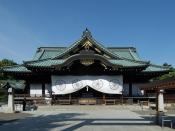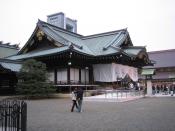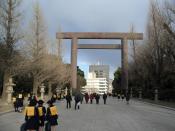The Yasukuni Shrine is a Shinto shrine established in 1869 in Tokyo. It was constructed in order to honor and worship the soldiers who have died for their country in the Boshin Civil War that brought about the Meiji restoration and sacrificed their lives in the service of their emperor to build a firm foundation for Japan to become a truly peaceful country. For some Asian countries such as China and South Korea, which had been victims under Japanese imperialism and aggression in the first half of the 20th century, the shrine was built to commemorate Japanese war criminals in the World War II, and it has become a blatant symbol for Japanese wartime militarism from the perspectives of these Asian countries. At the center of Yasukuni Shrine's controversy is the fact that those venerated included 14 convicted class-A war criminals, including former Prime Minister General Hideki Tojo. The Yasukuni Shrine is therefore frequently at the center of political storms, especially when several Japanese cabinet members and prime ministers pay their visits to worship the souls of the military war dead at the Shrine each year, as neighboring countries consider the visits by Japanese prime ministers to the shrine as an attempt to legitimize Japan's past militarism.
The politicized symbolism of the Yasukuni Shrine involves the conflict between incompatible Japanese party identities, the significance of Yasukuni in the Japanese nationalism, how the Japanese wartime history is perceived, and Japan's diplomatic and political relations with its neighboring East Asian countries.
Once an important site for rituals centered on the imperial emperor, Yasukuni symbolizes the nation's former fusion of the state and the Shinto religion, and it is the shrine where Japanese soldiers, officers, and civilian employees of the military who died in modern Japan's wars have been enshrined as heroic spirits.


